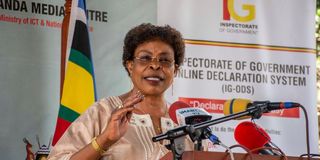IGG asks Ugandans to capture, share live corruption scenes

The IGG, Ms Beti Kamya, at a media briefing in Kampala on February 21, 2023. PHOTO/ISAAC KASAMANI
What you need to know:
- The Whistleblowers Protection Act (No. 6 of 2010) outlines procedures for individuals in both the public and private sectors to disclose information related to irregular, illegal, or corrupt practices.
- The Act also provides protection against victimization for those who make such disclosures.
The Inspector General of Government (IGG), Ms Beti Kamya, has urged Ugandans to actively participate in the fight against corruption by capturing instances of corruption in real-time and sharing them with the Inspectorate of Government.
This call was made during a press briefing at the Uganda Media Centre on July 11 as part of the commemoration of the African Anti-Corruption Day 2023, themed "Strategies and Mechanisms to reduce the cost of corruption in Uganda."
The African Anti-Corruption Day was established by the African Union (AU) and adopted by the African Union Convention on Preventing and Combating Corruption (AUCPCC) in Maputo, Mozambique in 2003. Its primary objective is to reflect on the efforts made by member states to combat corruption.
The IGG specifically encouraged junior officers working in Ministries, Departments, Agencies (MDAs), and local governments to become advocates for whistleblowing.
“There is Security and Motivation as well for Whistleblowers. We are bound by Law, the
Whistleblowers Act, to protect the Whistleblower. Anybody who exposes the whistleblower
commits an offence in this country. We also have a motivation for Whistleblowers by law. If
you give information to us, and that information directly leads to saving of money, you are
entitled by law to 5% of the money saved,” Ms Kamya said.
Whistleblowers are protected by law, and anyone who exposes them commits an offense.
The Whistleblowers Protection Act (No. 6 of 2010) outlines procedures for individuals in both the public and private sectors to disclose information related to irregular, illegal, or corrupt practices. The Act also provides protection against victimization for those who make such disclosures.
The IGG also called on the Directorate of Public Prosecutions (DPP) to explain the recent closure of the Iron Sheets Scandal case, which involved 17 government officials, including Speaker of Parliament Anita Among, Vice President Jessica Alupo, Prime Minister Robinah Nabbanja, Karamoja Affairs Minister Goretti Kitutu, and other ministers.
“I have not interrogated the DPP’s reason for the closure of the Iron sheets case. Since this
is a high-profile case, the DPP should explain to the people, so that they understand why the
case closed,” Ms Kamaya said.
To facilitate reporting of corruption cases, the IGG provided contact information for the public. A WhatsApp number (0707721146) was shared, along with an email address ([email protected]), where individuals can send information, photographs, recorded conversations, and other relevant details.
The IGG's call for citizen participation in the fight against corruption aims to foster transparency, accountability, and collective efforts in addressing the issue in Uganda.





